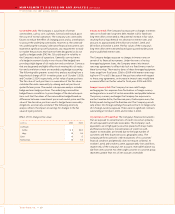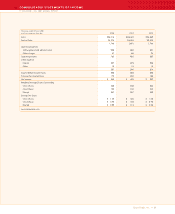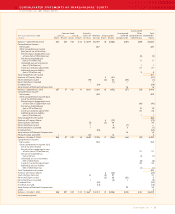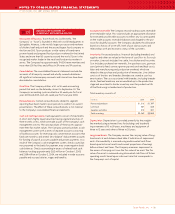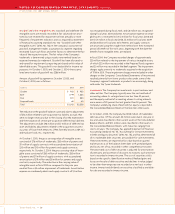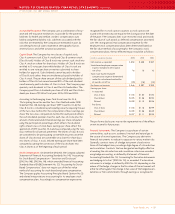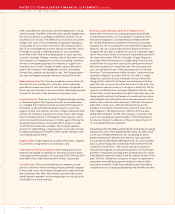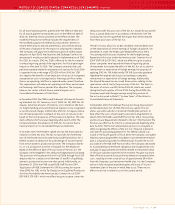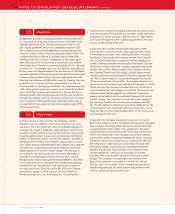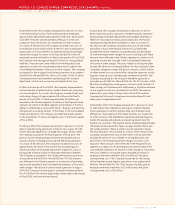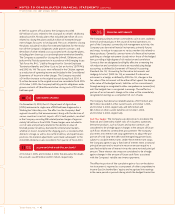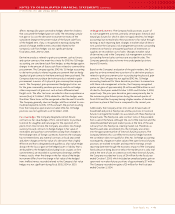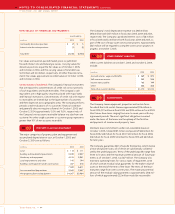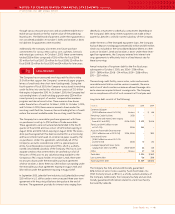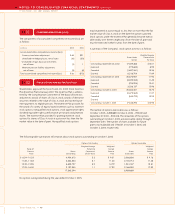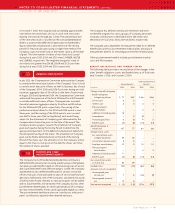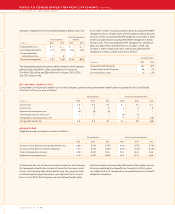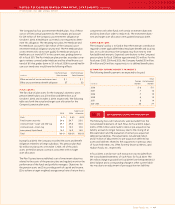Tyson Foods 2005 Annual Report Download - page 41
Download and view the complete annual report
Please find page 41 of the 2005 Tyson Foods annual report below. You can navigate through the pages in the report by either clicking on the pages listed below, or by using the keyword search tool below to find specific information within the annual report.
>> NOTES TO CONSOLIDATED FINANCIAL STATEMENTS (CONTINUED)
TYSON FOODS, INC. 2005 ANNUAL REPORT
>>>>>>>>>>>>>>>>
>>>>>>>>>>>>>>>>
Tyson Foods, Inc. >> 39
for all share-based payments granted after the effective date and
for all awards granted to employees prior to the effective date of
SFAS No. 123R that remain unvested on the effective date. The
modified retrospective method includes the requirements of
the modified prospective method, but also permits entities to
restate either all prior periods presented or prior interim periods
of the year of adoption for the impact of adopting this standard.
The Company will apply the modified prospective method upon
adoption. In April 2005, the Securities and Exchange Commission
announced it would provide for phased-in implementation of SFAS
No. 123R. As a result, SFAS No. 123R is effective for the first interim
or annual reporting period of the registrant’s first fiscal year begin-
ning on or after June 15, 2005. The Company estimates that com-
pensation expense related to employee stock options for fiscal 2006
is expected to be in the range of $10-$15 million. SFAS No. 123R
also requires the benefits of tax deductions in excess of recognized
compensation costs to be reported as financing cash flow, rather
than as an operating cash flow as required under current literature.
This requirement will reduce net operating cash flows and increase
net financing cash flows in periods after adoption. The Company
believes this reclass will not have a material impact on its
Consolidated Statements of Cash Flows.
In December 2004, the FASB issued Statement of Financial Account-
ing Standards No. 151, “Inventory Costs” (SFAS No. 151). SFAS No. 151
requires abnormal amounts of inventory costs related to idle facil-
ity, freight handling and wasted material expenses to be recognized
as current period charges. Additionally, SFAS No. 151 requires alloca-
tion of fixed production overheads to the costs of conversion be
based on the normal capacity of the production facilities. The stan-
dard is effective for fiscal years beginning after June 15, 2005. The
Company believes the adoption of SFAS No. 151 will not have a
material impact on its consolidated financial statements.
In October 2004, the President signed into law the American Jobs
Creation Act (the AJC Act). The AJC Act provides for the elimina-
tion of the Extraterritorial Income Exclusion (ETI) and allows for a
federal income tax deduction for a percentage of income earned
from certain domestic production activities. The Company’s domes-
tic, or U.S., production activities will qualify for the deduction.
Based on the effective date of this provision of the AJC Act, the
Company will be eligible for this deduction beginning in fiscal 2006.
This provision will be phased in from fiscal 2006 through fiscal 2011
and provides for a deduction of between 3% and 9% of qualifying
domestic production income over that period. Additionally, on
December 21, 2004, the FASB issued FASB Staff Position 109-1,
“Application of FASB Statement No. 109, Accounting for Income
Taxes (SFAS No. 109), to the Tax Deduction on Qualified Production
Activities Provided by the American Jobs Creation Act of 2004”
(FSP 109-1). FSP 109-1, which was effective upon issuance, states the
deduction under this provision of the AJC Act should be accounted
for as a special deduction in accordance with SFAS No. 109. The
Company has not yet quantified the impact that will be realized
from these provisions of the AJC Act.
The AJC Act also allows for an 85% dividends received deduction
on the repatriation of certain earnings of foreign subsidiaries. On
December 21, 2004, the FASB issued FASB Staff Position 109-2,
“Accounting and Disclosure Guidance for the Foreign Earnings
Repatriation Provision within the American Jobs Creation Act of
2004” (FSP 109-2). FSP 109-2, which was effective upon issuance,
allows companies time beyond the financial reporting period
of enactment to evaluate the effect of the AJC Act on its plan for
reinvestment or repatriation of foreign earnings for purposes of
applying SFAS No. 109. Additionally, FSP 109-2 provides guidance
regarding the required disclosures surrounding a company’s
reinvestment or repatriation of foreign earnings. Additionally,
the Internal Revenue Service issued three notices relating to the
repatriation, which clarify the provisions of the Act. The latest in
the series of notices was IRS Notice 2005-64, which was issued
during the fourth quarter of fiscal 2005. During fiscal 2005, the
Company repatriated foreign earnings using the provision of
the act as discussed in Note 17, “Income Taxes” of the Notes to
Consolidated Financial Statements.
In December 2003, the Medicare Prescription Drug, Improvement
and Modernization Act of 2003 (the Act) was signed. The Act
allows a possible subsidy to retirement health plan sponsors to
help offset the costs of participant prescription drug benefits. In
March 2004, the FASB issued Staff Position No. 106-2, “Accounting
and Disclosure Requirements Related to the Act” (the Position). The
Position was effective for interim or annual periods beginning after
June 15, 2004. The Position allowed plan sponsors to recognize or
defer recognizing the effects of the Act in its financial statements
until specific accounting guidance for this federal subsidy was
issued. In the fourth quarter of fiscal 2005, the Company concluded
the prescription drug benefits included in its postretirement medical
plan is actuarially equivalent to Medicare part D under the Act. In
accordance with FASB Staff Position 106-2, the Company decreased
its accumulated postretirement obligation and recognized an actu-
arial gain of approximately $55 million related to the present value
of all future subsidies expected to be received. This gain was more
than offset by actuarial losses primarily related to increased claims
costs, resulting in a net actuarial loss of approximately $9 million
from the Company’s postretirement health plan. It is the Company’s
policy to fully recognize experience gains and losses of its post-
retirement plans in the year in which they occur. There was no
effect on service or interest cost in the current period.



